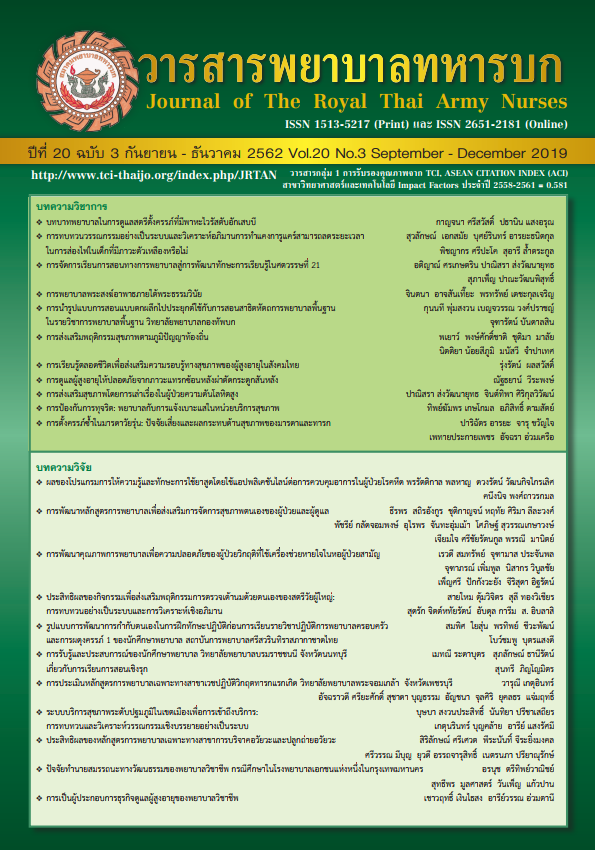Anticorruption: Nurses and Whistle-blowing in Healthcare Sector
Keywords:
Anticorruption, Whistle-blowing, Healthcare SectorAbstract
This article aims to present the importance of the corruption which is a moral crisis and a global problem that every country pays attention to. It can occur in the Ministry, hospitals and healthcare sectors. Nurses, the largest group in 12 professional fields, are the moral representatives who have professional ethics and many networks both domestically and internationally. There are professional organizations to monitor the operation of nurses. Nurses operate under relevant laws. Therefore, nurses should act as advocacy or whistleblowers. Whistle-blowing is considered as prosocial behaviors which are different from other good behaviors because nurses must be ethically courageous. The whistle-blowers may be in danger of the profession, physical, emotional, personal life, and family. This article will give knowledge about corruption and whistle-blowing and suggest guidelines for promoting whistle-blowing of professional nurses in healthcare sectors.
References
2. Ministry of public health. Master plan for prevention and suppression of corruption and misconduct, Ministry of public health, 5 years (2017-2021) Nonthaburi: Anti-Corruption Operation Center; 2017.
3. Hoppe T, Anti-Corruption Expert. Checklists on corruption risks in the health care sector Bosnia and Herzegovina: regional cooperation council; 2018.
4. Hechanova RM, Melgar I, Falguera PZ, Villaverde M. Organisational culture and workplace corruption in government hospitals. JPRP. 2014;8(2):62–70
5. Sawaengdee K, Ruangrattanatrai W. Report of the synthesis of medical and public health demand for the next 10 years (2009-2018) Nonthaburi: The National Health Commission office; 2018.
6. Thailand Nursing and Midwifery Council. Handbook of ethics for nursing organizations: mechanisms and practices. Bangkok: Golden Point Co., Ltd.; 2015.
7. Jackson D, Peters K, Andrew S, Edenborough M, Halcomb E, Luck L, et al. Understanding whistleblowing: qualitative insights from nurse whistleblowers. J Adv Nurs. 2010;66(10):2194-201.
8. Office of the Council of State. The criminal code act B.E. 2499. Bangkok; 2019.
9. Office of the National Anti-Corruption Commission. National strategy on corruption prevention and suppression, phase 3 (2017-2021). 2016.
10. Hauser C. Fighting against corruption: Does anti-corruption training make any difference? J Bus Ethics. 2019; 159(1):281-99.
11. Cambridge University Press. Cambridge advanced learner’s dictionary. Cambridge, United Kingdom: Cambridge University Press; 2013.
12. Hussmann K. Addressing corruption in the health sector: securing equitable access to health care for everyone. U4 Issue 2011. 2011;1:39.
13. Keil M, Tiwana A, Sainsbury R, Sneha S. Toward a theory of whistleblowing intentions: a benefit-to-cost differential perspective. Decis Sci. 2010;41(4): 787-812.
14. Lewis D. The contents of whistleblowing/confidential reporting procedures in the UK. Employee Relations. 2006; 28(1):76-86.
15. Jackson D, Hickman LD, Hutchinson M, Andrew S, Smith J, Potgieter I, et al. Whistleblowing: an integrative literature review of data-based studies involving nurses. Contemp Nurse. 2014;48(2): 240-52.
16. Black LM. Tragedy into policy: a quantitative study of nurses’ attitudes toward patient advocacy activities. Am J Nurs. 2011;111(6):26-35:quiz 6-7.
17. Mansbach A, Bachner YG. Internal or external whistleblowing: nurses’ willingness to report wrongdoing. Nursing Ethics. 2010;17(4):483-90.
18. Mannion R, Blenkinsopp J, Powell M, McHale J, Millar R, Snowden N, et al. Understanding the knowledge gaps in whistleblowing and speaking up in health care: narrative reviews of the research literature and formal inquiries,
a legal analysis and stakeholder interviews. HS&DR. 2018;6(30).
19. Hooper S. Understanding the ethics of whistleblowing by nurses. JARNA. 2011; 14(3):18-21.
20. Watts LL, Buckley MR. A dual-processing model of moral whistleblowing in organizations. J Bus Ethics. 2017;146(3): 669-83.
21. Vadera AK, Aguilera RV, Caza BB. Making sense of whistle-blowing’s antecedents: learning from research on identity and ethics programs. Bus Ethics Q. 2009;19(4):553-86.
22. Wilkes LM, Peters K, Weaver R, Jackson D. Nurses involved in whistleblowing incidents: sequelae for their families. Collegian. 2011;18(3):101-6.
23. Seifert DL, Stammerjohan WW, Martin RB. Trust, organizational justice, and whistleblowing: a research note. Behavioral Research in Accounting. 2014;26(1):157-68.
24. Cassematis PG, Wortley R. Prediction of whistleblowing or non-reporting observation: the role of personal and situational factors. J Bus Ethics. 2013;117(3):615-34.
25. Jones A, Kelly D. Whistle-blowing and workplace culture in older peoples’ care: qualitative insights from the healthcare and social care workforce. Sociol Health Illn. 2014;36(7):986-100
Downloads
Published
How to Cite
Issue
Section
License
บทความหรือข้อคิดเห็นใดใดที่ปรากฏในวารสารพยาบาลทหารบกเป็นวรรณกรรมของผู้เขียน ซึ่งบรรณาธิการหรือสมาคมพยาบาลทหารบก ไม่จำเป็นต้องเห็นด้วย
บทความที่ได้รับการตีพิมพ์เป็นลิขสิทธิ์ของวารสารพยาบาลทหารบก
The ideas and opinions expressed in the Journal of The Royal Thai Army Nurses are those of the authors and not necessarily those
of the editor or Royal Thai Army Nurses Association.





